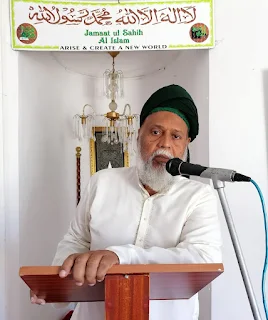In his Friday Sermon of 30 April 2021~17 Ramadan 1442 AH, Imam-Jamaat Ul Sahih Al Islam Hazrat Khalifatullah Munir A. Azim (aba) of Mauritius speaks about the holy month of Ramadan. Following in the footsteps of the Holy Prophet's practical ordinances concerning fasting in Ramadan, Hazrat Khalifatullah (aba) underscores the importance of the devotional practice with its inherent physical and spiritual benefits for those who observe it. Under the sacred Islamic teachings, Ramadan is meant to be observed as a month of patience; of caring and sharing; of charity and giving; of virtuous deeds and steadfastness in ultimate remembrance of God through the recurring undertaking of different faith rites and sublime invocations.
Describing the ways in which ignorant and negligent people waste away the precious occasion of Ramadan for the pursuit of entertainment and social pleasures, Hazrat Khalifatullah (aba) points to the very many benefits of fasting as an Islamic practice, and exhorts all believers to be conscious of the Divine commandments and Prophetic teachings to fulfill duties in this regard. Indeed, an occasion for the believer to focus on the big picture of spiritual life and therefore, to abandon his vain pursuits of earthly pleasures, in favour of the enduring favours of forgiveness of sins and the open-gates of Paradise. Noting that the many disasters striking the world around us is indeed a grave sign of the Hour (Qiyamah) promised in our sacred books, Hazrat Saheb (aba) exhorts everyone to benefit from the opportunity of Ramadan fasting to bring about internal cleansing and to put things right in social relations among peoples so that we may truly gain the Light of God in our remaining moments in this world, Aameen.
Read the Friday Sermon Below:
Leave the Reprehensible & Return to God
All
praise is to Allah for His favours and goodness. He has favoured us by enabling
us to reach the month of Ramadan and has strengthened us with the good works
that bring us closer to Him. And peace and blessings be on our prophet Muhammad
(pbuh), the first [in rank] in the accomplishment of good deeds, and on his
family and his companions, those who believed in him, supported him and
followed the light that was revealed to him. They are the ones who truly
succeeded.
Then
I commend you and myself the fear of Allah [Taqwa]
both in this month of Ramadan and in other months. But Allah (swt) attributes
special merit to this month, since it is a unique occasion for doing good
deeds. The prophet (pbuh) called on Allah to be able to reach Ramadan.
If
I am not mistaken, when the month of Rajab began, our beloved prophet (pbuh)
said: Allahumma barik lana fi Rajab wa Shabaan
wa ballighna Ramadan. [O Allah! Bless for us the months of Rajab and Shabaan and make us
reach [live] the month of Ramadan!]
And
the Holy Prophet (pbuh) also used to encourage his companions to make an effort
in good deeds, obligatory or supererogatory, such as prayers and alms, to be
good and beneficent, to be patient in the face of obedience to Allah, spend
one’s day in fasting, one’s night in prayers and hours reciting the Quran and
doing the Zikr of Allah.






_Islamic_Arts_Magazine.JPG)















